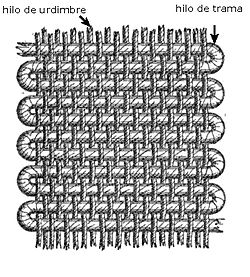Difference between revisions of "AY Honors/Weaving/Answer Key"
From Pathfinder Wiki
| Line 8: | Line 8: | ||
==2. Define the following: == | ==2. Define the following: == | ||
| − | ;a. Warp: | + | [[Image:Shuttle with bobin.jpg|thumb|100px|Shuttle with bobbin]] |
| − | ;b. Woof: | + | ;a. Warp: The warp is the set of lengthwise yarns through which the weft is woven. "Warp" means "that which is thrown across" (Old English wearp, from weorpan, to throw, cf. German werfen, Dutch werpen). When weaving with a loom, the warp yarns are fully attached before weaving begins. |
| − | ;c. Shuttle: | + | ;b. Woof: The woof, as often as not called the ''weft'', is the yarn which is drawn under and over parallel warp yarns to create a fabric. |
| − | ;d. Yarn beam: | + | ;c. Shuttle: A shuttle is a tool designed to neatly and compactly store weft yarn while weaving. Shuttles are thrown or passed back and forth through the shed, between the yarn threads of the warp in order to weave in the weft. |
| − | ;e. Heddle: | + | ;d. Yarn beam: The yarn beam is a stout pole at the head of the loom around which the warp threads are wrapped. As the cloth is woven, the yarn beam may be turned, unrolling additional yarn. This allows the weaver to make cloth that is longer than the loom. |
| − | ;f. Cloth beam: | + | ;e. Heddle: A heddle is an integral part of a loom. Each thread in the warp passes through a heddle, which is used to separate the warp threads for the passage of the weft. The average heddle is made of cord or wire, and is suspended on a shaft of a loom. Each heddle has an eye in the center where the warp is threaded through. As there is one heddle for each thread of the warp there can be near a thousand heddles used for fine or wide warps. A handwoven tea-towel will generally have between 300 and 400 warp threads, and thus use that many heddles. |
| + | ;f. Cloth beam: The cloth beam is a stout pole similar to the yarn beam, but it is situated at the foot of the loom. As the cloth is woven, it is rolled around the cloth beam. As with the yarn beam, the cloth beam allows the weaver to make cloth longer than the loom. | ||
| + | |||
==3. Make a cardboard hand loom on which an envelope purse can be woven. == | ==3. Make a cardboard hand loom on which an envelope purse can be woven. == | ||
==4. Design and weave a table runner or towel, using at least three different colors.== | ==4. Design and weave a table runner or towel, using at least three different colors.== | ||
Revision as of 01:59, 7 May 2008
1. Describe the principle involved in most weaving procedures.
Weaving is an ancient textile art and craft that involves placing two sets of threads or yarn called the warp and weft on a loom and turning them into cloth. This cloth can be plain (in one color or a simple pattern), or it can be woven in decorative or artistic designs, including tapestries.
In general, weaving involves the interlacing of two sets of threads at right angles to each other: the warp and the weft. In plain weaving, the weft goes over one thread of weft and under the next. On the next pass, it goes under and then over. This repeats. In other weaving patterns the sequence varies.
2. Define the following:
- a. Warp
- The warp is the set of lengthwise yarns through which the weft is woven. "Warp" means "that which is thrown across" (Old English wearp, from weorpan, to throw, cf. German werfen, Dutch werpen). When weaving with a loom, the warp yarns are fully attached before weaving begins.
- b. Woof
- The woof, as often as not called the weft, is the yarn which is drawn under and over parallel warp yarns to create a fabric.
- c. Shuttle
- A shuttle is a tool designed to neatly and compactly store weft yarn while weaving. Shuttles are thrown or passed back and forth through the shed, between the yarn threads of the warp in order to weave in the weft.
- d. Yarn beam
- The yarn beam is a stout pole at the head of the loom around which the warp threads are wrapped. As the cloth is woven, the yarn beam may be turned, unrolling additional yarn. This allows the weaver to make cloth that is longer than the loom.
- e. Heddle
- A heddle is an integral part of a loom. Each thread in the warp passes through a heddle, which is used to separate the warp threads for the passage of the weft. The average heddle is made of cord or wire, and is suspended on a shaft of a loom. Each heddle has an eye in the center where the warp is threaded through. As there is one heddle for each thread of the warp there can be near a thousand heddles used for fine or wide warps. A handwoven tea-towel will generally have between 300 and 400 warp threads, and thus use that many heddles.
- f. Cloth beam
- The cloth beam is a stout pole similar to the yarn beam, but it is situated at the foot of the loom. As the cloth is woven, it is rolled around the cloth beam. As with the yarn beam, the cloth beam allows the weaver to make cloth longer than the loom.


